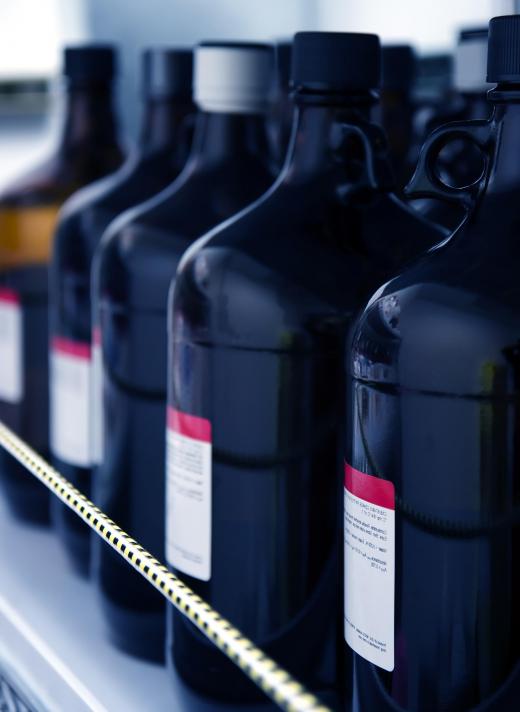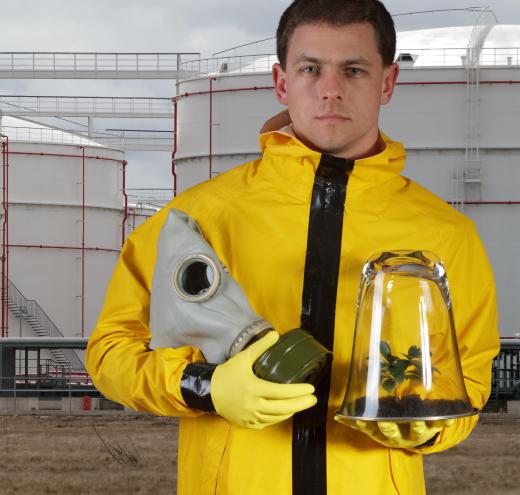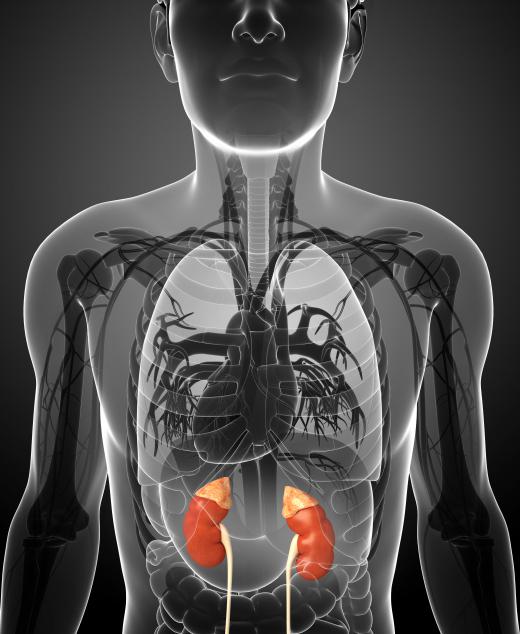What is Toluol?
Toluol, also known as toluene, phenylmethane, and methylbenzene, is a hydrocarbon compound most often used as a paint thinner, cleaner, and degreaser. It is widely used as a solvent in industry as many different substances dissolve easily in it. It has also been used in the process of removing cocaine from the coca leaves used in Coca-Cola® syrup. Present in low levels in crude oil, it is generally produced in the process of making gasoline. Toluol's molecular formula is C7H8 (C6H5CH3).
A powerful solvent, toluol can dissolve many substances, including paints, rubber, adhesives, lacquers, and leather tanners. It is an ingredient in polyurethane foam and is a component of TNT. In some specific cases, it can even be used as a cement by dissolving then fusing surfaces. The compound also has several industrial and chemical uses, as it reacts to form a wide array of different, useful substances. It is even a carbon source for the production of carbon nanotubules.

The myriad uses of toluol do not stop there. In biochemistry, it can be used to extract hemoglobin from red blood cells. It is sometimes used as an octane booster in gasoline fuels burned in internal-combustion engines. It can, however, damage fuel systems as it has no lubricating properties and it eats through standard rubber fuel lines. As it has impressive heat transfer properties, toluol is also often used as a coolant.

The inhalation of toluol fumes can have an intoxicating effect. At low levels, during the period of exposure, symptoms of inhalation include nausea, tiredness, confusion, memory loss, and sensory confusion. At high levels, exposure amplifies all of these symptoms and can even lead to unconsciousness or death. It is speculated that prolonged exposure could have an adverse effect on kidney function.

Toluol is toxic to humans primarily because it is nearly insoluble in water. As such, it can not be removed from the body by any traditional excretory pathway, and must be metabolized. Most of the products of its metabolism are broken down and detoxified. The remaining, however, can be very harmful to cells. It can be especially dangerous when ingested directly, which frequently happens when it infiltrates a water source.

Toluol is a very useful industrial chemical because of its versatility and because of its merits as a solvent. It can dissolve a wide variety of substances and is an important raw material in many other substances. Like many solvents, it has intoxicating effects when inhaled, and can be very dangerous—even deadly—in large quantities.
AS FEATURED ON:
AS FEATURED ON:















Discussion Comments
@Iluviaporos - I don't think that would be an option in this day and age. Coca Cola is just too big. Someone would have quickly tracked down any serious misuse of their products during manufacture and reported it as a scandal. At least, that's the case with drugs.
Actually, to be honest, I'd be more concerned with how they use the toluol than what they do with the cocaine. It sounds like a very dangerous chemical and big companies have a history of being careless when it comes to disposal of their dangerous chemicals. For some reason the public doesn't see that as as much of a scandal.
I actually wondered about the process of making Coca Cola the other day and looked it up. It's quite interesting because they are one of the very few companies that are legally able to import coca leaves into the United States. The leaves have cocaine in them, so generally the FDA doesn't allow them into the country at all.
Coca Cola has to use them as a flavor in its drinks though or they wouldn't taste right. And, while they once just included the cocaine in the drink as well, they obviously can't do that today (and haven't for over 100 years).
So, they use the toluol to strip out the cocaine in the United States. I always thought they must do it overseas or something. But they do it in New Jersey. And then they ship the leaves to where ever they make the soda syrup and they sell the cocaine to a company that makes it into a kind of anesthetic. Which is kind of cool really, because I guess I thought they probably did this overseas and didn't keep track of where the drugs went.
Post your comments